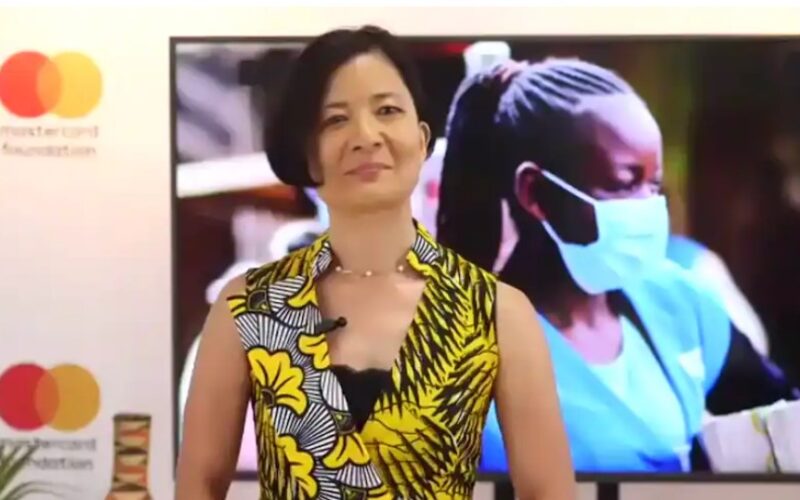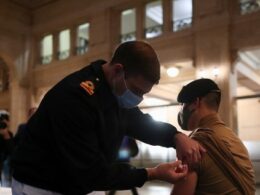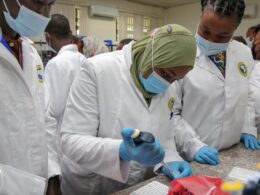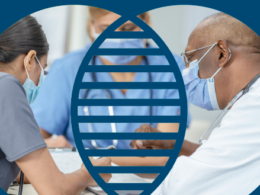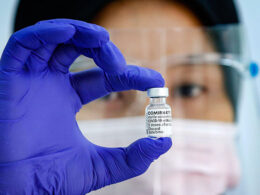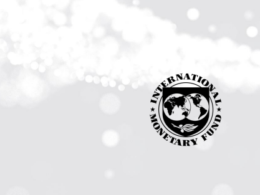Mastercard Foundation chief executive Reeta Roy announces her foundation’s $1.3 billion gift in a Zoom briefing Tuesday. (Dan Diamond/The Washington Post)
The money is intended to be used to acquire vaccines for more than 50 million people, boost the continent’s vaccine manufacturing and strengthen public health institutions
Washington Post
By Dan Diamond
June 8, 2021 at 11:17 a.m. GMT-3
The Mastercard Foundation on Tuesday announced a $1.3 billion donation to boost Africa’s response to the coronavirus, which public health experts hailed as a significant step to get vaccines to some of the world’s poorest people.
“Ensuring equitable access and delivery of vaccines across Africa is urgent,” Reeta Roy, the foundation’s CEO, said in a statement. “This initiative is about valuing all lives and accelerating the economic recovery of the continent.”
The funding, which will be distributed over three years in partnership with the Africa Centres for Disease Control and Prevention, is intended to
- help acquire vaccines for more than 50 million of the continent’s 1.3 billion people,
- improve its vaccine manufacturing and delivery system and
- strengthen public health institutions.
The foundation’s pledge — one of the largest private gifts made in the pandemic fight — comes amid a growing outcry over the lack of vaccine supply for poorer countries.
While the United States and other high-income countries have provided at least one dose of a vaccine to most of their residents, many developing countries are not expected to have sufficient vaccine supply until at least 2022.
President Biden this week is set to attend a Group of Seven meeting in Britain, where leaders are expected to debate how to address that vaccine inequality, which has sparked accusations from some advocates and public health officials that richer countries have fostered “vaccine apartheid” by hoarding doses.
The Mastercard Foundation, which says it has more than $39 billion in assets, has played a growing role in boosting Africa’s safety net during the pandemic, including a previous $40 million donation to boost the continent’s coronavirus testing.
Mastercard spun off the independently operated foundation when the global financial services company went public in 2006.
Under the terms of the arrangement, the Africa CDC will help oversee the distribution of funds across the continent for an array ofservices, including
- workforce training and community engagement;
- drug safety efforts and genomic sequencing; and
- support for individual nations’ vaccination programs.
“We’ve all during this pandemic acknowledged that Africa is lagging behind — and lagging behind seriously — in the battle against this very deadly disease,” John Nkengasong, director of the Africa CDC, told reporters on Tuesday. “We believe that this partnership will enable us to … win the current battles, but prepare for the next battle.”
The African Union and the Africa CDC last year set a goal of vaccinating at least 60 percent of the continent’s population by the end of 2022, estimating that the effort would cost at least $16 billion.
So far, fewer than 2 percent of people in Africa have received at least one dose of a coronavirus vaccine, significantly trailing the global average of 11.6 percent.
“Ensuring inclusivity in vaccine access, and building Africa’s capacity to manufacture its own vaccines, is not just good for the continent, it’s the only sustainable path out of the pandemic and into a health-secure future,” John Nkengasong, director of the Africa CDC, said in a statement.
About 40 percent of people in North America and the European Union have received at least one dose of a vaccine.
African leaders at a news briefing Tuesday morning said the gift would build on efforts to secure hundreds of millions of doses for the continent through Covax, the World Health Organization-backed initiative to distribute vaccine doses worldwide, and the African Vaccine Acquisition Task Team.
Wynne Musabayana, the head of communications for the African Union, said the foundation’s gift was unprecedented and would lead to “saving lives and saving livelihoods.”
White House Press Secretary Jen Psaki praised the gift as a “significant commitment” and a “welcome addition” to the Biden administration’s plan to share 5 million doses with the African Union.
Global public health experts hailed Tuesday’s donation as a difference-maker.
- “I think this is exactly the type of partnership that we had hoped to see — and that we need much more of,” said Krishna Udayakumar, who leads Duke University’s Global Health Innovation Center. “We need to be putting billions to tens of billions of dollars in play to acquire vaccines, but to also enhance the delivery capacity and capabilities and to generate demand.”
Udayakumar noted that Tuesday’s announcement calls for providing more doses to Africa “than have been shared across the continent to date.” Roughly 26 million people in Africahave received at least one dose of a coronavirus vaccine thus far,according to vaccinations tracked by the Our World in Data project at the University of Oxford.
- Amanda Glassman, executive vice president at the D.C.-based Center for Global Development, praised the decision to route the funding through the Africa CDC, which she said had played a growing role in coordinating the continent’s response to the pandemic. The five-year-old organization, which is modeled on the United States’ CDC, has helped set standards and provide public health governance, she said.
“It’s good to see that [the funding] is going to a regional institution, especially because we see cases going up in sub-Saharan Africa,” Glassman said.
Mastercard has separately committed nearly $100 million in company donations to boost the global coronavirus response, including
- a partnership with Gavi, the vaccine alliance, to improve global access to the shots, and
- last year’s launch of the COVID-19 Therapeutics Accelerator with the Gates Foundation and Wellcome Trust, intended to expedite development of coronavirus treatments.
Mastercard executives also said the company will create incentives to help address vaccine hesitancy in the United States, using the company’s decades-old “Priceless” marketing campaign.
About the author
Dan Diamond, is a national health reporter for The Washington Post.
He joined The Post in 2021 after five years at Politico, where he won a George Polk award for investigating the Trump administration’s response to the coronavirus pandemic.
Originally published at https://www.washingtonpost.com on June 8, 2021.




